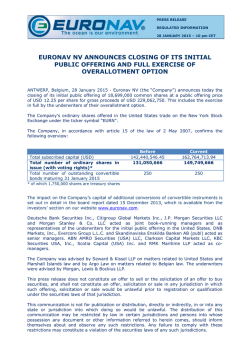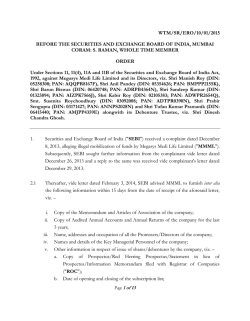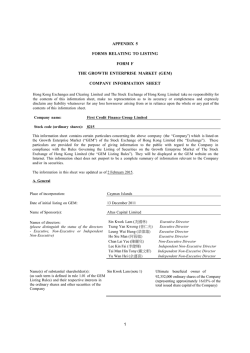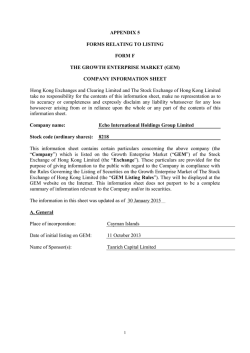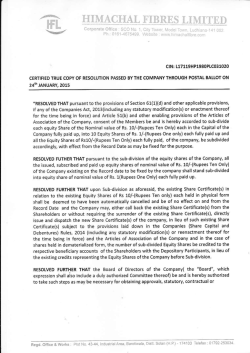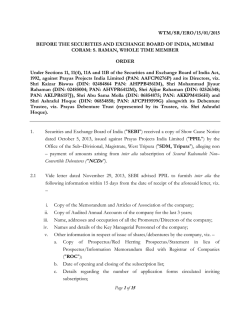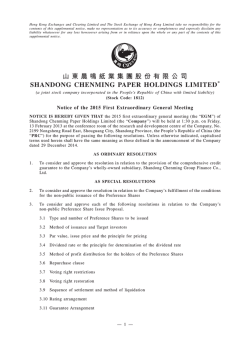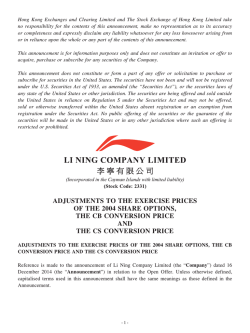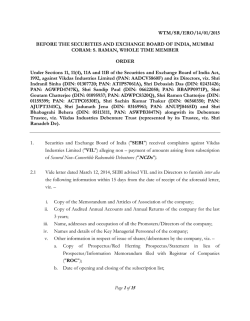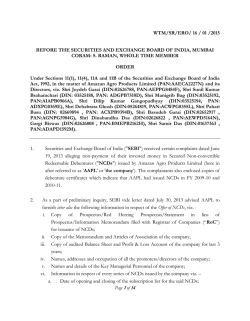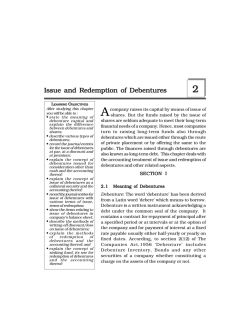
Page 1 of 13 WTM/SR/SEBI – ERO: PLO/17/02/2015 BEFORE THE
WTM/SR/SEBI – ERO: PLO/17/02/2015
BEFORE THE SECURITIES AND EXCHANGE BOARD OF INDIA, MUMBAI
CORAM: S. RAMAN, WHOLE TIME MEMBER
ORDER
Under Sections 11, 11(4), 11A and 11B of the Securities and Exchange Board of India Act,
1992, in the matter of Sarada Pleasure and Adventure Limited (PAN: AAMCS5786L) and
its Directors, viz. Shri Rakesh Shrivastav (DIN: 01863917; PAN: AJBPS9073R), Shri
Sukumar Debnath (DIN: 03212480), Shri Shubhankar Ray (DIN: 05260587), Smt.
Nandita Sengupta (DIN: 01864299) and Smt. Savita Srivastava (DIN: 01681840).
1.
Securities and Exchange Board of India ("SEBI") received several complaints against
Sarada Pleasure and Adventure Limited ("SPAL") alleging illegal mobilization of funds
from the public through the issue of Redeemable Preference Shares ("RPS").
2.1
SEBI vide letter dated July 25, 2014, advised SPAL to furnish inter alia the following
information within 15 days from the date of receipt of the aforesaid letter, viz. –
i.
ii.
iii.
iv.
v.
vi.
Copy of Prospectus/Red Herring Prospectus/Statement in lieu of
Prospectus/Information Memorandum filed with ROC for issuance of preference
shares.
Copy of the Memorandum and Articles of Association of the company;
Audited Balance Sheet and Profit & Loss Account of the company for the last 3
years;
Name, addresses and occupation of all the Promoters/Directors of the company;
Names and details of the Key Managerial Personnel of the company;
Other information in respect of every series of debenture/shares issued by the
company, viz. –
a. Date of opening and closing of the subscription list;
b. Details regarding the number of application forms circulated inviting
subscription;
c. Details regarding the number of applications received;
d. Details regarding the number of allottees and list of such allottees;
Page 1 of 13
e.
f.
g.
h.
i.
j.
k.
l.
Number of preference shares allotted and value of such allotment against each
allottee's name.
Details regarding subscription amount raised;
Date of allotment of preference shares;
Copies of the minutes of Board/Committee meeting in which the resolution has
been passed for allotment;
Date of dispatch of preference share Certificates;
Details of the total number of applicants for each of SPAL's scheme besides the
list of final allottee;
Copies of application forms, pamphlets, advertisements and other promotional
material circulated for issuance of debenture/shares;
Terms and conditions of the issue of debenture/shares.
2.2
The abovementioned letter was returned as undelivered to SEBI.
2.3
Thereafter, vide letters dated August 8, 2014 and August 29, 2014, SEBI once again
sought the information (sought vide abovementioned letter dated July 25, 2014) from
SPAL and its Directors.
2.4
SPAL replied vide September 18, 2014, wherein it inter alia provided Audited Balance
Sheet and Profit & Loss Account of the company for the last 3 years and submitted –
"The company has raised capital by way of issuing redeemable preference shares starting from
30/03/2009 to 15/05/2012 and issued total shares of
222067700. Since then the company has
started redeem the shares time to time as on date the balance remains with the company is
(approx)."
14 Cr
2.5
Subsequent to the above, SEBI received a complaint dated December 3, 2014, alleging
non – payment of amounts arising from subscription of RPS.
3.
The material available on record i.e. correspondences exchanged between SEBI and
SPAL, information obtained from the Ministry of Corporate Affairs' website i.e. 'MCA
21 Portal' alongwith the complaints received by SEBI, have been perused. On an
examination of the same, it is observed that –
Page 2 of 13
i.
SPAL was incorporated on January 8, 2008, with the ROC, Patna with CIN No. as
U01132BR2008PCL013364. SPAL's Registered Office is at Office No. S – 5, Fifth
Facing Towords, Chandi House Residential Complex, Exhibition Road, Patna–
800001, Bihar, India.
ii.
The present Directors in SPAL are Shri Rakesh Shrivastav, Shri Sukumar Debnath
and Shri Shubhankar Ray.
iii. Smt. Nandita Sengupta and Smt. Savita Srivastava, who were earlier Directors in
SPAL, have since resigned.
iv. From the MCA21 Portal, Form 2 (Form for Return of Allotment – filed by SPAL
with the ROC in accordance with the provisions of the Companies Act, 1956) for
the Financial Years 2008–09, 2009–10, 2010–11, 2011–12 and 2012–13, the
following details were obtained –
Financial Year
2008–09
Date of
Allotments
30.03.09
02.02.10
30.03.10
No. of
Shareholders*
285
694
650
No of Shares
Issued
45592
49423
141828
Cumulative no. of
Shares
45592
95015
236843
2009–10
30.06.10
15.09.10
720
Details Not Available
111559
152539
348402
500941
2010–11
15.12.10
01.02.11
650
335
181446
53173
682387
735560
2011–12
25.04.11
08.08.11
15.11.11
01.03.12
1157
Details Not Available
1145
1257
281540
274605
346925
282070
1017100
1291705
1638630
1920700
2012–13
15.05.12
1260
299977
2220677
Page 3 of 13
4.1
In the context of the abovementioned details of the Offer of Redeemable Preference Shares, the
issue for determination in the instant matter is whether the mobilization of funds by
SPAL through the aforesaid, is in accordance with the provisions of the SEBI Act, 1992
("SEBI Act"), the SEBI (Disclosure and Investor Protection) Guidelines, 2000 ("DIP
Guidelines") and the Companies Act, 1956.
4.2
I note that the jurisdiction of SEBI over various provisions of the Companies Act in the
case of public companies, whether listed or unlisted, when they issue and transfer
securities, flows from the provisions of Section 55A of the Companies Act. While
examining the scope of Section 55A of the Companies Act, 1956, the Hon'ble Supreme
Court of India in Sahara India Real Estate Corporation Limited & Ors. vs. SEBI
(Civil Appeal no. 9813 of 2011) (Judgment dated August 31, 2012) (hereinafter
referred to as the "Sahara Case"), had observed that:
"We, therefore, hold that, so far as the provisions enumerated in the opening portion of Section 55A of
the Companies Act, so far as they relate to issue and transfer of securities and non-payment of dividend is
concerned, SEBI has the power to administer in the case of listed public companies and in the case of
those public companies which intend to get their securities listed on a recognized stock exchange in India."
4.3
In this regard –
i.
Reference is also made to Sections 67(1) and 67(3) of the Companies Act, 1956,
which are reproduced as under:
"67. Construction of reference to offering shares or debentures to the public,
etc.
67. (1) Any reference in this Act or in the articles of a company to offering shares or debentures to
the public shall, subject to any provision to the contrary contained in this Act and subject also to the
provisions of sub-sections (3) and (4), be construed as including a reference to offering them to any
section of the public, whether selected as members or debenture holders of the company concerned or
as clients of the person issuing the prospectus or in any other manner.
(2) Any reference in this Act or in the articles of a company to invitations to the public to subscribe
for shares or debentures shall, subject as aforesaid, be construed as including a reference to
invitations to subscribe for them extended to any section of the public, whether selected as members or
Page 4 of 13
debenture holders of the company concerned or as clients of the person issuing the prospectus or in
any other manner.
(3) No offer or invitation shall be treated as made to the public by virtue of sub- section (1) or subsection (2), as the case may be, if the offer or invitation can properly be regarded, in all the
circumstances(a) as not being calculated to result, directly or indirectly, in the shares or debentures becoming
available for subscription or purchase by persons other than those receiving the offer or invitation; or
(b) otherwise as being a domestic concern of the persons making and receiving the offer or invitation.
Provided that nothing contained in this sub-section shall apply in a case where the offer or
invitation to subscribe for shares or debentures is made to fifty persons or more:
Provided further that nothing contained in the first proviso shall apply to non-banking financial
companies or public financial institutions specified in section 4A of the Companies Act, 1956 (1 of
1956).”
ii.
While examining the scope of Section 67 of the Companies Act, 1956, the Hon'ble
Supreme Court of India in the Sahara Case observed that:
"Section 67(1) deals with the offer of shares and debentures to the public and Section 67(2) deals
with invitation to the public to subscribe for shares and debentures and how those expressions are to
be understood, when reference is made to the Act or in the articles of a company. The emphasis in
Section 67(1) and (2) is on the “section of the public”. Section 67(3) states that no offer or
invitation shall be treated as made to the public, by virtue of subsections (1) and (2), that is to any
section of the public, if the offer or invitation is not being calculated to result, directly or indirectly, in
the shares or debentures becoming available for subscription or purchase by persons other than those
receiving the offer or invitation or otherwise as being a domestic concern of the persons making and
receiving the offer or invitations. Section 67(3) is, therefore, an exception to Sections 67(1) and (2).
If the circumstances mentioned in clauses (1) and (b) of Section 67(3) are satisfied, then the
offer/invitation would not be treated as being made to the public.
The first proviso to Section 67(3) was inserted by the Companies (Amendment) Act, 2000 w.e.f.
13.12.2000, which clearly indicates, nothing contained in Sub-section (3) of Section 67 shall apply
in a case where the offer or invitation to subscribe for shares or debentures is made to fifty persons or
more. …
Resultantly, if an offer of securities is made to fifty or more persons, it would be deemed to be a
public issue, even if it is of domestic concern or proved that the shares or debentures are not available
for subscription or purchase by persons other than those received the offer or invitation. …
Page 5 of 13
I may, therefore, indicate, subject to what has been stated above, in India that any share or
debenture issue beyond forty nine persons, would be a public issue attracting all the relevant
provisions of the SEBI Act, regulations framed thereunder, the Companies Act, pertaining to the
public issue. …"
iii. In the instant matter, for ascertaining whether the Offer of Redeemable Preference Shares
is a public issue or an issue on private placement basis in accordance with Section 67
of the Companies Act, 1956, the number of subscribers is of utmost importance.
a.
Under the Offer of Redeemable Preference Shares, it is observed that during the
Financial Years 2008–09, 2009–10, 2010–11, 2011–12 and 2012–13, SPAL
allotted 2220677 redeemable preference shares to a total of more than 8000
individuals/investors and admittedly mobilized an amount of 22.20 Crores
(Table at para 3(iv) of page 3 and SPAL's reply dated September 18, 2014). The
number of investors to whom allotments were made under the Offer of
Redeemable Preference Shares during the Financial Years 2008–09, 2009–10, 2010–
11, 2011–12 and 2012–13 alongwith the amount mobilized therein, would prima
facie indicate that the number of persons to whom such Offer was made, was
above the limit of forty–nine persons as prescribed under the first proviso to
Section 67(3) of the Companies Act, 1956.
4.4
b.
It is observed that SPAL is not stated to be a Non – banking financial company
or public financial institution within the meaning of Section 4A of the
Companies Act, 1956. In view of the aforesaid, I, therefore, find that SPAL is
not covered under the second proviso to Section 67(3) of the Companies Act,
1956.
c.
In view of the above, the Offer of Redeemable Preference Shares by SPAL, would
prima facie qualify as a public issue under the first proviso to Section 67(3) of the
Companies Act, 1956. In this regard, it is pertinent to note that by virtue of
Section 55A of the Companies Act, 1956, Section 67 of that Act, so far as it
relates to issue and transfer of securities, shall also be administered by SEBI.
I note that –
Page 6 of 13
i.
From the abovementioned, it will follow that since the Offer of Redeemable Preference
Shares is a public issue of securities, such securities shall also have to be listed on a
recognized stock exchange, as mandated under Section 73 of the Companies Act,
1956. In this regard, reference is made to Sections 73 of the Companies Act, 1956,
of which sub-Sections (1), (2) and (3) are relevant for the instant case, which is
reproduced as under:
"73. (1) Every company intending to offer shares or debentures to the public for subscription by the
issue of a prospectus shall, before such issue, make an application to one or more recognised stock
exchanges for permission for the shares or debentures intending to be so offered to be dealt with in the
stock exchange or each such stock exchange.
(1A) Where a prospectus, whether issued generally or not, states that an application under subsection (1) has been made for permission for the shares or debentures offered thereby to be dealt in
one or more recognized stock exchanges, such prospectus shall state the name of the stock exchange
or, as the case may be, each such stock exchange, and any allotment made on an application in
pursuance of such prospectus shall, whenever made, be void, if the permission has not been granted
by the stock exchange or each such stock exchange, as the case may be, before the expiry of ten
weeks from the date of the closing of the subscription lists:
Provided that where an appeal against the decision of any recognized stock exchange refusing
permission for the shares or debentures to be dealt in on that stock exchange has been preferred
under section 22 of the Securities Contracts (Regulation) Act, 1956 (42 of 1956), such allotment
shall not be void until the dismissal of the appeal.
(2) Where the permission has not been applied under subsection (1) or such permission having been
applied for, has not been granted as aforesaid, the company shall forthwith repay without interest all
moneys received from applicants in pursuance of the prospectus, and, if any such money is not repaid
within eight days after the company becomes liable to repay it, the company and every director of the
company who is an officer in default shall, on and from the expiry of the eighth day, be jointly and
severally liable to repay that money with interest at such rate, not less than four per cent and not
more than fifteen per cent, as may be prescribed, having regard to the length of the period of delay in
making the repayment of such money.
(3) All moneys received as aforesaid shall be kept in a separate bank account maintained with a
Scheduled Bank 1 [until the permission has been granted, or where an appeal has been preferred
against the refusal to grant such. permission, until the disposal of the appeal, and the money
standing in such separate account shall, where the permission has not been applied for as aforesaid
or has not been granted, be repaid within the time and in the manner specified in sub- section (2)];
Page 7 of 13
and if default is made in complying with this sub- section, the company, and every officer of the
company who is in default, shall be punishable with fine which may extend to five thousand rupees.”
ii.
In the Sahara Case, the Hon'ble Supreme Court of India also examined Section 73 of
the Companies Act, 1956, wherein it observed that –
"Section 73(1) of the Act casts an obligation on every company intending to offer shares or
debentures to the public to apply on a stock exchange for listing of its securities. Such companies
have no option or choice but to list their securities on a recognized stock exchange, once they invite
subscription from over forty nine investors from the public. If an unlisted company expresses its
intention, by conduct or otherwise, to offer its securities to the public by the issue of a prospectus, the
legal obligation to make an application on a recognized stock exchange for listing starts. Sub-section
(1A) of Section 73 gives indication of what are the particulars to be stated in such a prospectus.
The consequences of not applying for the permission under sub-section (1) of Section 73 or not
granting of permission is clearly stipulated in sub-section (3) of Section 73. Obligation to refund the
amount collected from the public with interest is also mandatory as per Section 73(2) of the Act.
Listing is, therefore, a legal responsibility of the company which offers securities to the public,
provided offers are made to more than 50 persons.
… Section 73(2) says that every company and every director of the company who is an officer in
default, shall be jointly and severally liable to repay that money with interest at such rate, not less
than four per cent and not more than fifteen per cent, as may be prescribed. The scope of the above
mentioned provisions came up for consideration before this Court in Raymond Synthetics Ltd. &
Ors. V. Union of India (supra), wherein the Court held that in a case where the company has not
applied for listing on a stock exchange, the consequences will flow from the company’s disobedience of
the law, the liability to pay interest arises as from the date of receipt of the amounts, for the company
ought not to have received any such amount in response to the prospectus. I am, therefore, of the view
that since Saharas had violated the listing provisions and collected huge amounts from the public in
disobedience of law, SEBI is justified in directing refund of the amount with interest."
iii. Having regard to the abovementioned observations of the Hon'ble Supreme Court
of India, since the Offer of Redeemable Preference Shares is prima facie a public issue in
accordance with the provisions of the Companies Act, 1956, the same will attract the
requirement of compulsory listing before a recognized stock exchange in terms of
Section 73(1) of the Companies Act, 1956 and also compliance with the provisions
of Sections 73(2) and 73(3) of that Act.
Page 8 of 13
iv. In the facts of the instant case, it prima facie appears that SPAL has violated the
provisions of Section 73 of the Companies Act, 1956, in respect of the Offer of
Redeemable Preference Shares.
4.5
Under Section 2(36) read with Section 60 of the Companies Act, 1956, a company needs
to register its prospectus with the ROC, before making a public offer or issuing the
prospectus. As per the aforesaid Section 2(36), “prospectus” means any document
described or issued as a prospectus and includes any notice, circular, advertisement or
other document inviting deposits from the public or inviting offers from the public for
the subscription or purchase of any shares in, or debentures of, a body corporate. As
mentioned above, since the Offer of Redeemable Preference Shares was made to fifty persons
or more, it has to be construed as a public offer. Having made a public offer, SPAL was
required to register a prospectus with the ROC under Section 60 of the Companies Act,
1956. I find that there is no evidence on record to indicate whether or not SPAL has
complied with the provisions of Section 60 of Companies Act, 1956. In view of the
same, I find that SPAL has prima facie not complied with the provisions of Section 60 of
Companies Act, 1956.
4.6
Under Section 56(1) of the Companies Act, 1956, every prospectus issued by or on
behalf of a company, shall state the matters specified in Part I and set out the reports
specified in Part II of Schedule II of that Act. Further, as per Section 56(3) of the
Companies Act, 1956, no one shall issue any form of application for shares in or
debentures of a company, unless the form is accompanied by abridged prospectus,
contain disclosures as specified. Based on the material available on record, I find that
SPAL has not complied with the provisions of Section 56(1) and 56(3) of the Companies
Act, 1956 and therefore, has prima facie violated the aforesaid provisions.
4.7
Upon a consideration of the aforementioned paragraphs, I am of the view that SPAL is
prima facie engaged in fund mobilising activity from the public, through the Offer of
Redeemable Preference Shares and as a result of the aforesaid activity has violated the
aforementioned provisions of the Companies Act, 1956 (Section 56, Section 60 read with
Section 2(36), Section 73).
Page 9 of 13
4.8
I also note that SEBI framed the DIP Guidelines, in exercise of the powers conferred
under the SEBI Act. In the words of the Hon'ble Supreme Court in the Sahara Case,
"DIP Guidelines had statutory force since they were framed by SEBI in exercise of its powers conferred
on it under Sections 11 and 11A of the SEBI Act. Powers have been conferred on SEBI to protect the
interests of the investors in securities and regulate the issue of prospectus, offer documents or advertisement
soliciting money through the issue of prospectus. Section 11 of the Act, it may be noted has been
incorporated, evidently to protect the interests of investors whose securities are legally required to be listed.
DIP Guidelines were implemented by SEBI with regard to the listed and unlisted companies, which
made public offer, until it was replaced by ICDR 2009". In this regard, I observe prima facie that
the SPAL has not complied with the following provisions of the DIP Guidelines in
respect of the Offer of Redeemable Preference Shares during the Financial Year 2008–09 –
a.
b.
c.
d.
e.
f.
g.
h.
i.
j.
k.
l.
m.
n.
o.
p.
q.
r.
s.
t.
u.
v.
Clause 2.1.1. – (Filing of offer document)
Clause 2.1.4 – (Application for listing)
Clause 2.1.5 – (Issue of securities in dematerialized form),
Clause 2.8 – (Means of finance),
Clause 4.1 – (Promoters contribution in a public issue by unlisted companies),
Clause 4.11 – (Lock-in of minimum specified promoters contribution in public issues),
Clause 4.14 – (Lock-In of pre-issue share capital of an unlisted company)
Clause 5.3.1 – (Memorandum of understanding),
Clause 5.3.3 – (Due Diligence Certificate)
Clause 5.3.5 – (Undertaking),
Clause 5.3.6 – (List Of Promoters Group And Other Details),
Clause 5.4 – (Appointment of intermediaries)
Clause 5.6 – (Offer document to be made public)
Clause 5.6A – (Pre-issue Advertisement)
Clause 5.7 – (Despatch of issue material)
Clause 5.8 – (No complaints certificate)
Clause 5.9 – (Mandatory collection centres including Clause 5.9.1 (Minimum number of
collection centres)
Clause 5.10 – (Authorised Collection Agents)
Clause 5.12.1 – (Appointment of compliance officer)
Clause 5.13 – (Abridged prospectus)
Clause 6.0 – (Contents of offer documents)
Clause 8.3 – (Rule 19(2)(b) of SC(R) Rules, 1957)
Page 10 of 13
w.
x.
y.
z.
4.9
Clause 8.8.1 – (Opening & closing date of subscription of securities)
Clause 9 – (Guidelines on advertisements by Issuer Company)
Clause 10.1 – (Requirement of credit rating)
Clause 10.5 – (Redemption)
As per Regulation 111(1) of the ICDR Regulations, the DIP Guidelines, "shall stand
rescinded". However, Regulation 111(2) of the ICDR Regulations, provides that:
"(2)Notwithstanding the repeal under sub-section (1) of the repealed enactments,—
(a) anything done or any action taken or purported to have been done or taken including observation
made in respect of any draft offer document, any enquiry or investigation commenced or show cause notice
issued in respect of the said Guidelines shall be deemed to have been done or taken under the
corresponding provisions of these regulations;
(b) any offer document, whether draft or otherwise, filed or application made to the Board under the said
Guidelines and pending before it shall be deemed to have been filed or made under the corresponding
provisions of these regulations."
5.
SEBI has a statutory duty to protect the interests of investors in securities and promote
the development of, and to regulate, the securities market. Section 11 of the SEBI Act
has empowered it to take such measures as it deems fit for fulfilling its legislative
mandate. Further, as per the provisions of Section 55A of the Companies Act, 1956,
administrative authority on the subjects relating to public issue of securities is exclusively
with SEBI. For this purpose, SEBI can exercise its jurisdiction under Sections 11(1), 11A,
11B and 11(4) of the SEBI Act read with Section 55A of the Companies Act, 1956 (as
mentioned in paragraphs 4.1–4.9 above). Steps therefore, have to be taken in the instant
matter to ensure only legitimate fund raising activities are carried on by SPAL and no
investors are defrauded. In light of the facts in the instant matter, I find that there is no
other alternative but to take recourse through an interim action against SPAL and its
Directors, for preventing that company from further carrying on with its fund mobilising
activity under the Offer of Redeemable Preference Shares.
6.
I note that Smt. Nandita Sengupta and Smt. Savita Srivastava, who were earlier Directors
in SPAL, have since resigned. In this regard, it is prima facie observed that the
aforementioned former Directors were also involved in the fund mobilizing activity
Page 11 of 13
under the Offer of Redeemable Preference Shares carried out by SPAL during the period they
were Directors in that company.
7.
In view of the foregoing, I, in exercise of the powers conferred upon me under Sections
11, 11(4), 11A and 11B of the SEBI Act, hereby issue the following directions –
i.
ii.
iii.
iv.
v.
vi.
vii.
8.
SPAL (PAN: AAMCS5786L) shall not mobilize funds from investors through the
Offer of Redeemable Preference Shares or through the issuance of equity shares or any
other securities, to the public and/or invite subscription, in any manner whatsoever,
either directly or indirectly till further directions;
SPAL and its present Directors, viz. Shri Rakesh Shrivastav (DIN: 01863917; PAN:
AJBPS9073R), Shri Sukumar Debnath (DIN: 03212480) and Shri Shubhankar Ray
(DIN: 05260587) alongwith its past Directors, viz. Smt. Nandita Sengupta (DIN:
01864299) and Smt. Savita Srivastava (DIN: 01681840), are prohibited from issuing
prospectus or any offer document or issue advertisement for soliciting money from
the public for the issue of securities, in any manner whatsoever, either directly or
indirectly, till further orders;
SPAL and its abovementioned past and present Directors, are restrained from
accessing the securities market and further prohibited from buying, selling or
otherwise dealing in the securities market, either directly or indirectly, till further
directions;
SPAL shall provide a full inventory of all its assets and properties;
The abovementioned past and present Directors of SPAL shall provide a full
inventory of all their assets and properties;
SPAL and its abovementioned present Directors shall not dispose of any of the
properties or alienate or encumber any of the assets owned/acquired by that
company through the Offer of Redeemable Preference Shares, without prior permission
from SEBI;
SPAL and its abovementioned present Directors shall not divert any funds raised
from public at large through the Offer of Redeemable Preference Shares, which are kept in
bank account(s) and/or in the custody of SPAL.
The above directions shall take effect immediately and shall be in force until further
orders.
Page 12 of 13
9.
The prima facie observations contained in this Order are made on the basis of the material
available on record i.e. correspondences exchanged between SEBI and SPAL,
information obtained from the Ministry of Corporate Affairs' website i.e. 'MCA 21 Portal'
alongwith the complaints received by SEBI. In this context, SPAL and its
abovementioned past and present Directors may, within 21 days from the date of receipt
of this Order, file their reply, if any, to this Order and may also indicate whether they
desire to avail themselves an opportunity of personal hearing on a date and time to be
fixed on a specific request made in that regard.
10.
This Order is without prejudice to the right of SEBI to take any other action that may be
initiated against SPAL and its abovementioned past and present Directors in accordance
with law.
Place: Mumbai
Date: February 2, 2015
S. RAMAN
WHOLE TIME MEMBER
SECURITIES AND EXCHANGE BOARD OF INDIA
Page 13 of 13
© Copyright 2026
